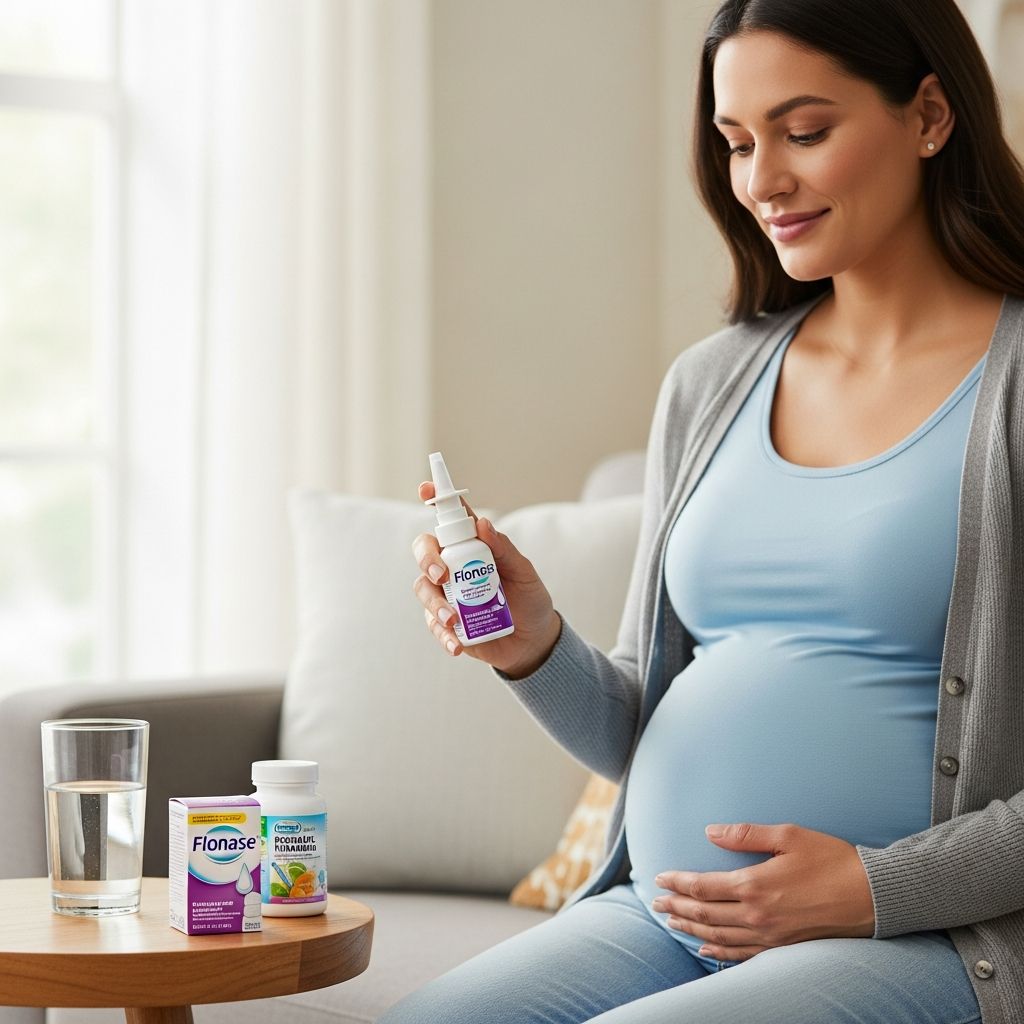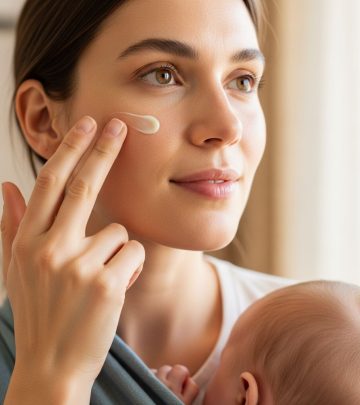Flonase Safety During Pregnancy: What Parents Need to Know
Understanding the safety, risks, and best practices for using Flonase and similar nasal sprays during pregnancy.

Allergies and nasal congestion are common complaints among pregnant individuals, with symptoms ranging from mild discomfort to severe interference with daily life. Flonase, a popular over-the-counter nasal spray containing fluticasone propionate, is widely used to manage allergy symptoms. However, many expectant parents want to know: is Flonase safe during pregnancy?
What is Flonase?
Flonase is a nasal corticosteroid spray containing fluticasone propionate. It works by reducing inflammation in the nasal passages, thus relieving symptoms like sneezing, runny nose, and congestion caused by allergies. Flonase is available in two primary versions: Flonase Allergy Relief (fluticasone propionate) and Flonase Sensimist (fluticasone furoate).
Flonase and Pregnancy: The Science on Safety
Current research and expert recommendations suggest that most nasal corticosteroid sprays, including Flonase, are considered safe during pregnancy if used at recommended doses. There is minimal risk of Fluticasone or similar steroids affecting the unborn baby due to their local action and low systemic absorption.
- Minimal systemic absorption: Fluticasone nasal sprays are designed to act locally within the nasal passages. Only a very small amount enters the bloodstream, and almost none reaches the fetus.
- No adverse outcomes reported: Research, including small case series and larger cohort studies, has shown no association between appropriate use of inhaled fluticasone and adverse maternal or fetal outcomes.
- Expert guidelines: Both national and international allergy and obstetric organizations recommend continuing appropriate corticosteroid therapy for allergy and asthma control during pregnancy .
Comparing Nasal Allergy Sprays in Pregnancy
| Nasal Spray Type | Main Ingredient | Pregnancy Safety | Notes |
|---|---|---|---|
| Flonase Allergy Relief | Fluticasone Propionate | Generally safe | Preferred option if needed; minimal absorption |
| Flonase Sensimist | Fluticasone Furoate | Safe | Effective, minimal systemic effect |
| Rhinocort | Budesonide | Safest option | Often preferred by obstetricians |
| Nasonex | Mometasone | Safe | Alternative option |
| Nasalcrom | Cromolyn sodium | Very safe | Less effective, slower onset |
| Triamcinolone | Triamcinolone acetonide | Not recommended | Associated with fetal respiratory risks |
Why Use Flonase During Pregnancy?
Allergies and pregnancy rhinitis can affect quality of life for expectant parents. Flonase offers symptomatic relief and helps maintain well-being without significant medication risks when used correctly. Controlled allergic symptoms are associated with better pregnancy outcomes.
- Manage chronic symptoms: Nasal allergy sprays prevent debilitating symptoms such as facial pressure, sneezing, and congestion.
- Improve quality of sleep: Relief of nasal blockage can promote restful sleep—the foundation of maternal health.
- Potential to reduce other medication use: Effective allergy control may reduce need for systemic medications.
Risks and Considerations
While intranasal corticosteroids like Flonase are generally safe, a few caveats remain:
- Therapeutic dose adherence: Always use the lowest effective dose as prescribed by your healthcare provider.
- Avoid excess and prolonged use: Overuse could theoretically increase systemic absorption.
- Monitor for side effects: Most side effects are local (e.g., nasal dryness, irritation, mild nosebleed); systemic effects are rare.
Current evidence indicates that oral and topical corticosteroids—not nasal sprays—are associated with a marginal increased risk of birth defects when used extensively. The risk with inhaled therapies like Flonase is not significant.
Alternatives to Flonase for Allergy Relief
While Flonase is a first-line option, several other therapies may provide allergy relief during pregnancy:
- Budesonide nasal spray (Rhinocort): Often considered the safest steroid spray for pregnant individuals.
- Mometasone nasal spray (Nasonex): Another corticosteroid considered safe.
- Saline nasal sprays: Provide symptom relief with no medication exposure; ideal for mild cases.
- NasalCrom: Cromolyn sodium is exceptionally safe, though less effective and slow-acting.
- Nasal antihistamines: Astepro (azelastine) and Patanase (olopatadine) can be considered, though data on pregnancy safety is limited; always consult with your provider first.
Medications to Avoid
- Oral decongestants: These are best avoided as they may increase risk for birth defects or negatively impact pregnancy, especially in the first trimester.
- Triamcinolone nasal sprays: Linked to respiratory tract malformations; not recommended during pregnancy.
- Non-prescription oral antihistamines: Only certain types (loratadine, cetirizine) are preferred during pregnancy, while others (chlorpheniramine, diphenhydramine) should be used cautiously.
Pregnancy Rhinitis: What You Should Know
Pregnancy rhinitis refers to nasal congestion and runny nose not caused by allergies or infection but by hormonal changes. Symptoms can last for weeks or months and may resolve postpartum. Most nasal sprays—including Flonase—can help with pregnancy rhinitis, as can saline sprays.
Non-medication Approaches
- Humidifiers: Keeping air moist reduces nasal dryness and irritation.
- Gentle steam inhalation: Can provide immediate but temporary relief.
- Elevating the head during sleep: May reduce nighttime congestion.
Expert Guidelines and Medical Advice
Professional guidelines emphasize the importance of treating allergies during pregnancy for maternal and fetal well-being:
- Continue prescribed corticosteroid therapy: Discontinuing allergy medication may worsen symptoms, impact breathing, and increase risk of complications.
- Consult your provider: Always discuss your medication plans before making changes, starting new drugs, or if symptoms worsen.
- Monitor your health: Report any unusual symptoms or possible side effects to your healthcare provider promptly.
Breastfeeding and Fertility Considerations
- Breastfeeding: It is generally safe to continue Flonase during breastfeeding, with minimal transfer of medication into breast milk and negligible exposure for infants.
- Fertility: Current evidence suggests fluticasone does not impair fertility in either men or women.
Frequently Asked Questions (FAQs)
Can I use Flonase during pregnancy?
Yes, when used as directed. Most evidence indicates no increased risk of birth defects or adverse pregnancy outcomes with appropriate use of Flonase.
Which nasal sprays are the safest option?
Budesonide (Rhinocort), Fluticasone propionate (Flonase), Fluticasone furoate (Flonase Sensimist), and Mometasone (Nasonex) are considered safe. Triamcinolone nasal sprays should be avoided.
Are there natural alternatives if I want to avoid medication?
Yes. Consider saline nasal sprays, humidifiers, steam inhalation, and head elevation during sleep for symptom relief without medication exposure.
Should I stop using Flonase if I become pregnant?
No, do not stop prescribed medications suddenly. Allergic symptoms may worsen, so consult your prenatal care team for tailored recommendations.
Does Flonase affect breastfeeding?
No significant impact. Flonase is unlikely to cause side effects in breastfed infants due to minimal transfer in breast milk.
Can Flonase affect my fertility?
There is no evidence to suggest Flonase nasal spray impairs fertility in men or women.
Tips for Safe Allergy Management During Pregnancy
- Always use medications as prescribed: Stick to the recommended dose and consult your healthcare provider with questions.
- Monitor your symptoms: Keep a symptom diary and share it during prenatal appointments.
- Stay hydrated and maintain good nasal hygiene: Use saline rinses and humidifiers to reduce irritation and dryness.
- Avoid unnecessary medication changes: Do not start or stop allergy treatments during pregnancy unless recommended by your healthcare professional.
Signs You Should Contact Your Healthcare Provider
- You experience severe or worsening nasal symptoms.
- You develop nosebleeds, persistent headaches, or breathing difficulties.
- Your baby is not feeding well (if breastfeeding).
- You have concerns about medication side effects or interactions.
Conclusion: Balancing Relief and Safety
Flonase and similar nasal corticosteroid sprays remain among the safest and most effective options for managing allergy symptoms during pregnancy. Used appropriately, they rarely cause harm to the developing fetus and can substantially improve maternal comfort and health outcomes. Regular consultation with your healthcare provider and adherence to prescribed dosing are key to safe allergy management for expectant parents.
For patients with mild symptoms or concerns about medications, non-pharmacological approaches like saline sprays may offer relief. Ultimately, effective allergy control is not only about comfort—it’s about supporting overall pregnancy health and well-being.












